The Ultimate Guide to Black Salt: a Unique Salt With Surprising Health Benefits
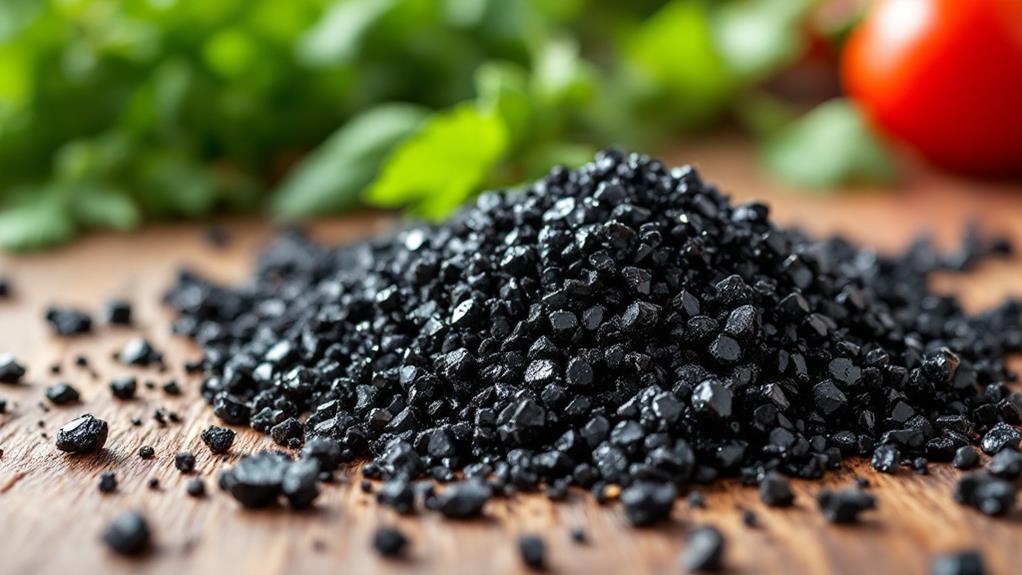
Uncover the wonders of black salt and its surprising health perks. This unique seasoning, rich in minerals like iron and magnesium, offers a savory, egg-like flavor that enhances dishes—from vegan to gourmet. With a lower sodium content, it's kinder to your heart, helps manage weight, and aids digestion. However, moderation is key, as excessive intake might pose risks like kidney stones. The varieties, whether Indian Kala Namak or Hawaiian Black Lava Salt, each bring distinct characteristics that elevate your culinary adventures. Plunge deeper to reveal how integrating black salt into your diet can transform your health and flavor profile.
Varieties of Black Salt
Black salt comes in several intriguing varieties, each with its unique characteristics and culinary uses. Indian black salt, also known as Kala Namak, stands out with its pinkish-brown hue and is rich in minerals like iron and sulfur compounds. This gives it a savory flavor reminiscent of eggs, making it a favorite in Southern Asian dishes. You might find this variety adds a distinctive twist to your vegan omelets or chutneys.
Himalayan black salt, sourced from volcanic rock salt in the Himalayan region, boasts unique properties and a complex flavor profile. You'll appreciate its health benefits, attributed to its mineral content, which can be a great supplement to your culinary creations. Imagine improving the taste of your dishes while potentially increasing your well-being.
Exploring other varieties of black salt, you'll uncover they each offer something special. From the earthy notes of Hawaiian Black Lava Salt, enriched with activated charcoal, to the light, crunchy texture of Cyprus Black Flake Salt, these salts can raise your meals. Regardless of you're crafting a gourmet masterpiece or experimenting with new recipes, the diverse varieties of black salt will improve both flavor and presentation.
Nutritional Composition
Delving into the nutritional composition of black salt reveals a wealth of beneficial elements that can improve your diet. Black salt is not just about its distinctive taste; it's a nutritional powerhouse, rich in crucial minerals and low in sodium, setting it apart from regular table salt. Its unique flavor profile comes from sulfur compounds, giving it that umami kick you might find intriguing.
Here's a breakdown of what makes black salt special:
- Minerals: Black salt contains potassium, calcium, magnesium, and iron, all vital minerals that support overall health and well-being.
- Low Sodium: Compared to regular salt, black salt provides a lower sodium option, making it a healthier choice for those watching their sodium intake.
- Rich in Antioxidants: The natural form of black salt is packed with antioxidants, which can help combat oxidative stress and support your body's defenses.
- Sulfur Compounds: These compounds not only contribute to black salt's unique flavor profile but also add a distinctive aroma, often described as savory or umami.
In addition to these benefits, black salt's nutritional profile is improved by small amounts of vitamins A, C, and E, offering more reasons to contemplate it in your culinary adventures.
Health Benefits
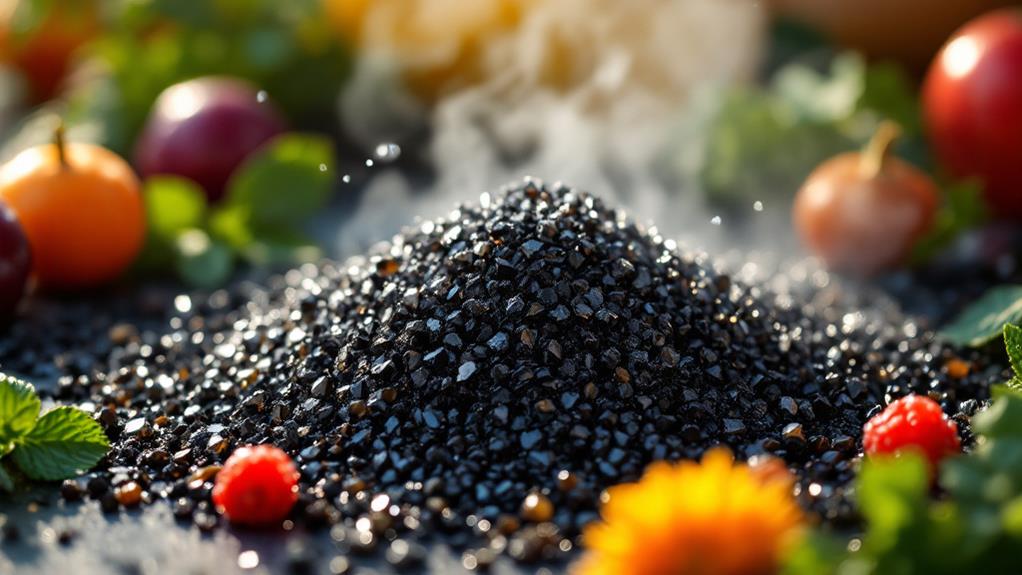
When you incorporate black salt into your diet, you're not just improving flavor—you're tapping into a wealth of health benefits. This unique seasoning is rich in minerals like iron, calcium, and magnesium, which are essential for maintaining overall wellness. Unlike regular table salt, black salt has low sodium content, making it a heart-friendly option that may aid in managing cholesterol levels and regulating blood pressure.
One of the standout health benefits of black salt is its antioxidant properties. These help combat oxidative stress, potentially lowering the risk of chronic diseases. By reducing oxidative damage, you're supporting your body's defenses against harmful free radicals. Additionally, the presence of iron in black salt helps raise your body's iron levels, which is especially beneficial if you're prone to deficiencies that lead to fatigue and weakness.
Digestive issues like heartburn and bloating can be alleviated by black salt's ability to stimulate bile production, improving digestion. This function not only eases discomfort but also improves nutrient absorption. Furthermore, its low sodium quality helps prevent water retention and bloating, promoting healthier weight management. By choosing black salt, you're making a flavorful and health-conscious decision.
Potential Health Risks
Some might not realize that while black salt offers numerous health benefits, it also carries potential risks when consumed excessively. A few aspects to be aware of include:
- Kidney Stones: The high mineral content of black salt can lead to kidney stones if you consume too much. This is because the minerals can accumulate and form crystals in the kidneys.
- Sulfur Allergies: Those with sulfur allergies should be cautious. Black salt contains sulfur compounds that might trigger severe allergic reactions, including anaphylactic shock.
- Cardiovascular Issues: Overconsumption can exacerbate cardiovascular issues. It's crucial to stick to the recommended daily intake, especially if you have high blood pressure. For most, this means no more than 6 grams, but for those with high blood pressure, it should be limited to 3.75 grams.
- Other Health Risks: Excessive consumption of black salt could disrupt bodily functions, leading to headaches, dizziness, and skin irritations. Furthermore, its high fluoride content poses a risk of dental fluorosis, particularly in children.
Being mindful of these potential health risks will help you enjoy the benefits of black salt without compromising your health.
Recommended Dosage
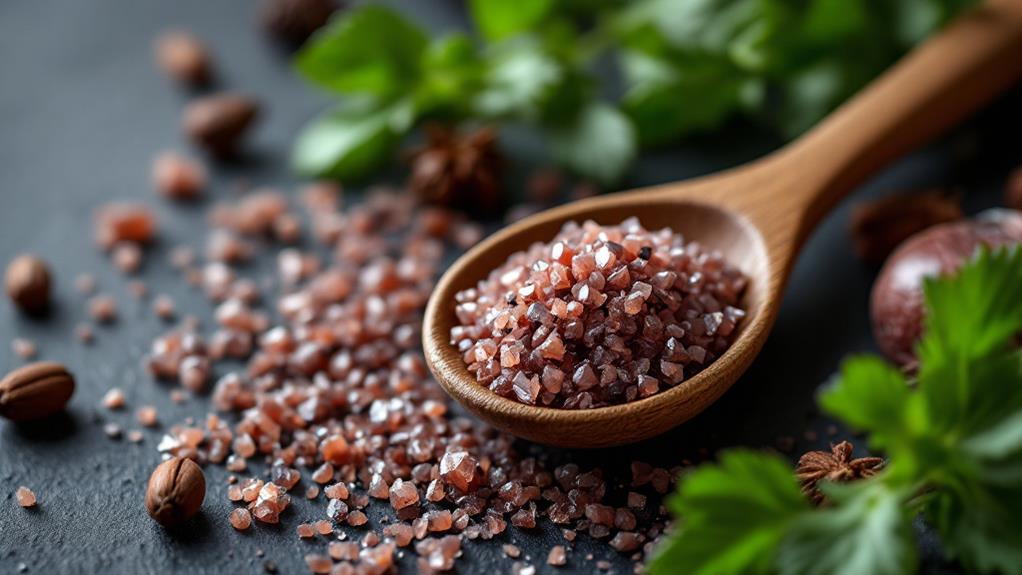
Understanding the recommended dosage of black salt is vital to harnessing its benefits without encountering potential health risks. For the general population, the recommended daily intake of black salt should not exceed 6 grams. This guarantees that you enjoy its unique properties while keeping your sodium intake in check. If you have high blood pressure, a tighter limit of 3.75 grams daily is advised to help manage your condition effectively. Consuming black salt in moderation can contribute to digestive health, but it's critical to monitor your complete salt intake to prevent any negative effects on your body.
Since black salt is non-iodized, pairing it with iodized salt is significant to maintain adequate iodine levels. This balance helps avoid any nutritional deficiencies while you benefit from black salt's distinct flavor and health advantages. Regularly assess your sodium intake to sidestep potential health risks, such as disruptions in bodily functions. By being mindful of these guidelines, you can make the most of black salt's health benefits without compromising your well-being. Remember, moderation and a balanced approach are key to incorporating black salt into your diet safely and effectively.
Culinary Uses
Balancing the health benefits of black salt with its culinary uses allows you to enjoy both its flavor and nutritional advantages. Black salt is a star in Indian cuisine, known for its ability to raise dishes with unique flavours. You'll find it improving the flavor of chaats, chutneys, and even vegan dishes, where it mimics egg-like flavors. Its rich mineral content not only amplifies taste but also offers medicinal properties that can contribute to your well-being.
Here's how you can use black salt in your culinary applications:
- Seasoning: Sprinkle it on snacks and salads for an umami kick that enriches flavors beautifully. Black salt adds a surprising twist to beverages like lemonade, combining taste with health benefits.
- Pickling and Preserving: Utilize its unique mineral composition to pickle and preserve foods, enhancing both taste and longevity.
- Finishing Salt: Use it as a bold finishing salt for meats, sashimi, and baked goods. Its dramatic color and flavor profile add visual appeal and depth.
- Homemade Beauty Recipes: Utilize its natural exfoliating properties in scrubs and masks, all while improving your culinary applications.
Experiment with these ideas and let black salt transform your cooking adventures!
Integrating Into Diet
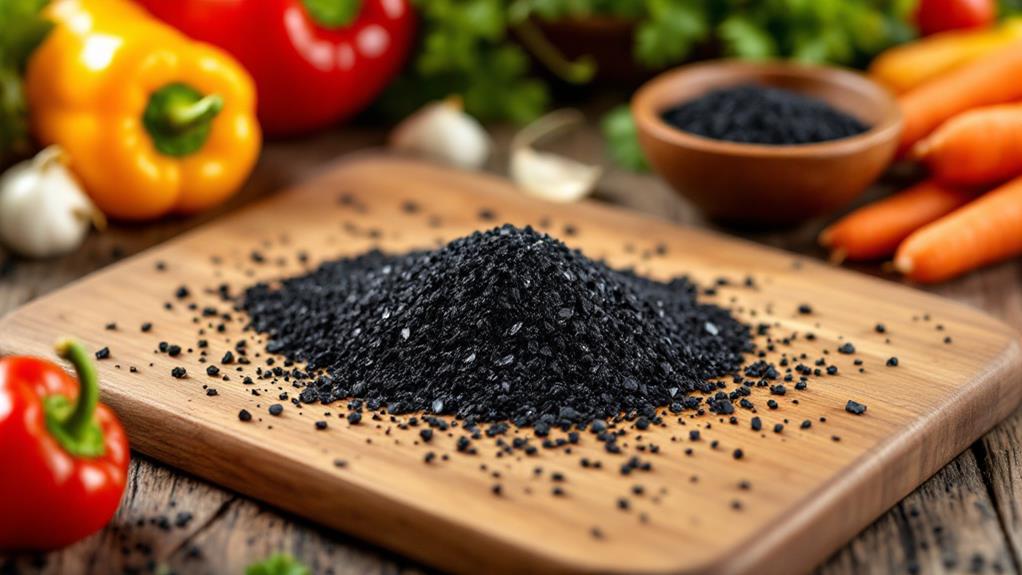
Incorporating black salt into your diet can improve both the flavor and nutritional profile of your meals. Black salt, used in cooking, can transform ordinary dishes into extraordinary culinary experiences. Its distinctive sulfurous aroma and savory taste play a significant role in vegan recipes, particularly in mimicking egg flavors. When you integrate black salt into your diet, you tap into its unique health benefits, thanks to its rich mineral content.
To enjoy the benefits of black salt, consider adding it to chaats, salads, or marinades, where its flavour makes a noteworthy impact. However, it's essential to consume in moderation. Limit your daily intake to no more than 6 grams, or 3.75 grams if you have high blood pressure, to avoid potential health risks. Since black salt is non-iodized, make sure you also use iodized salt in your meals to maintain proper iodine levels and support thyroid health.
Beyond cooking, black salt can boost detoxifying routines, like baths or scrubs, to harness its skin benefits while maintaining a balanced diet. By thoughtfully integrating black salt into your diet, you can enjoy its flavorful and healthful contributions without compromising nutritional balance.
Comparisons With Other Salts
As you investigate the role of black salt in your diet, it's helpful to compare it with other types of salts to fully understand its unique characteristics. Black salt, especially Indian black salt (Kala Namak), offers a distinct sulfurous flavor that sets it apart from other salts. Here's how it compares:
- Flavor Profile: Black salt has a sulfurous taste that mimics egg flavors, making it a favorite in vegan cooking. In contrast, Himalayan pink salt provides a milder, mineral-rich taste, while kosher and sea salts are generally used for basic seasoning.
- Mineral Content: Black salt contains vital minerals like iron, calcium, and magnesium. However, Himalayan pink salt is noted for its over 80 trace minerals, adding complexity to its nutritional profile.
- Processing: Unlike table salt, which is heavily refined and often iodized, black salt retains more natural minerals. This makes it a healthier choice, although you should note it lacks iodine.
- Sodium Levels: Black salt is generally lower in sodium than regular table salt, offering a significant benefit for those watching their sodium intake.
Beauty and Skincare Uses
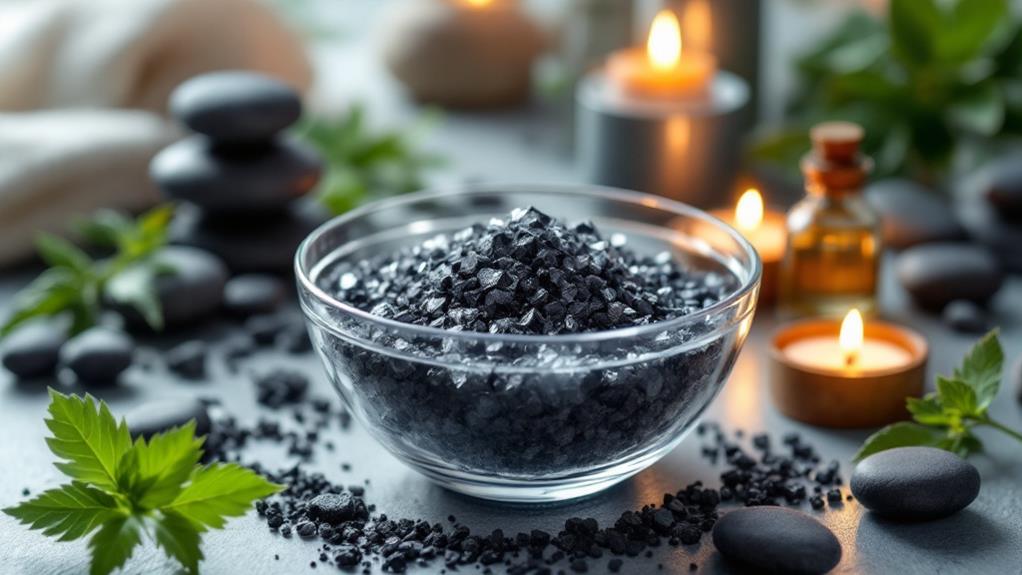
Harnessing the unique properties of black salt can transform your skincare routine, providing natural solutions for diverse skin concerns. For those with acne-prone skin, black salt acts as a deep cleanser, thanks to its granular texture that effectively unclogs pores and removes dirt. Its exfoliating properties also help reduce excessive oiliness, promoting blood circulation which gives your skin a healthy glow and smoother texture.
Creating a black salt scrub is simple and effective. By mixing black salt with baking soda, olive oil, and your favorite vital oils, you can naturally exfoliate the skin while balancing pH levels. This homemade beauty recipe not only revives dull skin but also aids in treating acne and blemishes due to the antibacterial properties of black salt.
Beyond exfoliation, black salt contributes to skin hydration, helping to prevent dryness and flakiness. Regular application can reduce dark circles and puffiness under the eyes, making it a versatile enhancement to your skincare regimen. Welcome the power of black salt to achieve a radiant complexion and smooth skin texture, all while utilizing the benefits of natural ingredients in your beauty routine.
Ongoing Research and Insights
Why is black salt gaining so much attention in health research today? It's all about its unique composition and potential health benefits. Researchers are intrigued by the low sodium content that could positively impact cardiovascular health. They're also exploring its potential to regulate digestion and metabolism, thanks to its rich mineral and sulfur content. Let's explore the ongoing research that highlights the promising advantages of black salt:
- Digestion and Metabolism: Black salt's unique mineral composition may aid in digestion and metabolic regulation, making it a subject of interest for scientists.
- Antioxidant Properties: Some studies suggest that the antioxidants in black salt could contribute to general health, although more clinical trials are necessary to confirm these benefits.
- Cardiovascular Health: The low sodium content might influence blood pressure and cholesterol levels, offering a promising alternative for those seeking heart-friendly seasoning options.
- Detoxification: Activated charcoal found in certain black salt types may improve detoxification, prompting further research into its health applications.
Additionally, there's an ongoing interest in its culinary uses, as its distinctive flavor profile could serve as a healthier alternative to regular table salt in multiple dishes. The expedition of exploration continues, with black salt at the forefront of groundbreaking health research.




